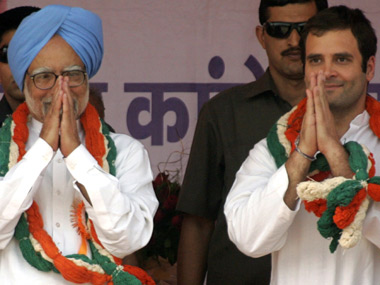That the UPA has been a disaster on all fronts needs no overstating. If expressions like policy paralysis, governance deficit, leadership vacuum, ego tussle and lack of moral authority keep cropping up in every description of the government, it means it has squandered the mandate to run the country. For UPA II, the fall in public esteem has been unusually fast – it was only in 2009 it had returned to power — and it looks remote at this point that it would recover the lost ground before the 2014 general election. Interestingly, it is not massive scandals – a baggage from the earlier stint — that’s proving to be the government’s undoing; it’s the inability to address the growing perception that UPA is in drift and is imploding slowly under the weight of several contradictions. [caption id=“attachment_113643” align=“alignleft” width=“380” caption=“Populism wins elections not clear-headed policies which deliver results only in the long run. Reuters”]  [/caption] At the core of the mess is the unresolved question in the Congress. Who won the election in 2009 for the UPA—is it the reformist Prime Minister Manmohan Singh with a clean image or the populist Sonia Gandhi who saddled the country with the expensive NREGA? An influential section of the party firmly believes it is the latter and is convinced that that the party would repeat its electoral performance in 2014 by bribing the poor again through the Rs 90,000-crore Food Security Act. Its damaging effect on the economy, of course, is a minor concern for the party. With a good number of leaders aligning themselves with this line of thinking, no wonder, the prime minister and his ideas are redundant in the Congress scheme of things. It does not help that he is not assertive and poor at communicating his beliefs and that he is a political lightweight compared to his colleagues in the Union ministry. He is in office but not in control, that’s the general impression and it shows everywhere – in governance, in policy formulation, in strategising to battling allegations of corruption and efforts at blunting the opposition attacks. Sharad Pawar, the chief of the Nationalist Congress Party (NCP) and an old ally of the Congress, made clear as much at a public meeting recently. A series of scandals has weakened the UPA’s moral authority, he said, adding this has led to institutions like the judiciary asserting themselves at the cost of the government. “There was a loss of public opinion due to this 2G scam and the public questioned why the prime minister was not intervening. At such a time, it is important to have a strong central government. But it does not seem to be the case. Because of this, the judiciary and other forces have come to the fore… People’s representatives or democracy should be strong. If others try to fill in for them, it becomes worrisome for the democratic process,” The Indian Express quoted Pawar as saying at a function. He also said that the Congress’ ill-conceived pro-poor projects such as the Food Security Bill would drain the exchequer and leave little funds for developmental work. “Fuel subsidy is running up to Rs 1.15 lakh crore, fertilizer subsidy will be Rs 80,000 crore and Rs 40,000 crore for NREGA. If so much money is spent on subsidies, what will be left for development work?” Pawar was quoted in the Express report. He said the Food Security Act, if implemented, would cost the exchequer Rs 1.15 lakh crore more. A genuine concern, maybe this is something Manmohan Singh agrees to as well. But no one in the Congress is expected to speak out openly on this. The party has clearly made economy — by extension, the country— secondary to elections. After all, populism wins elections not clear-headed policies which deliver results only in the long run. When you are not thinking beyond one option and one solution to issues it is bound to result in confusion in your responses in other areas. Senior DMK leader TR Baalu has criticised the government for failing to handle properly issues like the CAG report on the 2G spectrum allocation scam, Anna Hazare’s anti-corruption movement and inflation. “I feel the government could have handled these issues in a better way. It has not only given us a bad press but also changed the public perception about UPA’s handling of corruption. This will reflect not only on DMK but on Congress and other allies as well,” Baalu told the Hindustan Times. “The opposition is scoring points by propagating a negative propaganda and we are unable to stop that,” he added. But is the Congress even thinking about negative perception at the moment? Till some days ago it appeared too unwieldy with senior leaders under nobody’s control. It’s not yet clear what kind of a role Sonia and Rahul play in the party. But it is certainly not working to the advantage of the government and Manmohan Singh.
It is not clear the exact role Sonia and Rahul play in the Congress but it certainly works to the detriment of the UPA.
Advertisement
End of Article


)
)
)
)
)
)
)
)
)



